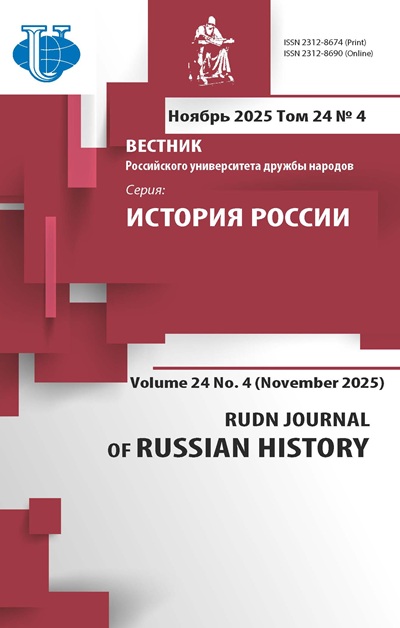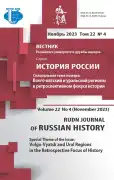Activities of the Guardianships of National Sobriety in the Urals in Late XIX - Early XХ Century: Regional Experience in the Anti-Alcohol Struggle
- Authors: Kazakova-Apkarimova E.Y.1
-
Affiliations:
- Institute of History and Archeology of the Ural Branch of the Russian Academy of Sciences
- Issue: Vol 22, No 4 (2023): Volga-Vyatsk and Ural Regions in the Retrospective Focus of History
- Pages: 559-572
- Section: VOLGA-VYATSK AND URAL REGIONS IN THE RETROSPECTIVE FOCUS OF HISTORY
- URL: https://journal-vniispk.ru/2312-8674/article/view/321918
- DOI: https://doi.org/10.22363/2312-8674-2023-22-4-559-572
- EDN: https://elibrary.ru/OVGCFA
- ID: 321918
Cite item
Full Text
Abstract
The author reconstructs the regional historical experience of the anti-alcohol struggle in pre-revolutionary Russia. There is emphasized important practical significance of the problem under study in the context of solving problems of promoting a healthy lifestyle in modern Russian society. A wide range of historiographical literature and sources is involved, on the basis of which it is shown that by the beginning of the XX century in the work of the Ural guardianships of national sobriety there dominated the cultural and educational trend. The author comes to the conclusion that in late XIX - early XX centuries the guardianships of national sobriety failed to stop the spread of drunkenness in the region. However, despite the limited material resources allocated from the treasury, these institutions made a significant contribution to the organization of “reasonable” leisure for the Ural residents and to the development of the culture of the Ural society as a whole. The social support of guardianships of national sobriety in the Urals was one of the prerequisites for strengthening the temperance movement in the region during the period under review. Under the harsh conditions of the state-owned wine monopoly, the temperance movement was the spiritual and mental response of the public (secular and church) to the challenges of the time, and the promotion of the idea of sobriety was a palliative means of resolving this issue.
About the authors
Elena Yu. Kazakova-Apkarimova
Institute of History and Archeology of the Ural Branch of the Russian Academy of Sciences
Author for correspondence.
Email: apkarimova@mail.ru
ORCID iD: 0000-0001-7852-3539
Dr. Habil. Hist., Associate Professor, Leading Researcher of the Center for Methodology and Historiography
16, S. Kovalevskoi St., Yekaterinburg, 620990, RussiaReferences
- Bulgakovskii, D.G. Ocherk deiatel'nosti popechitel'stv o narodnoi trezvosti za vse vremia ikh sushhestvovaniia (1895-1909) [Essay on the activities of the guardianships of people's sobriety for the entire time of their existence (1895-1909)]. St. Petersburg: Otechestvennaia tipographiia Publ., 1910 (in Russian).
- Bykova, A.G. “Alcohol issue in the Russian Empire in the second half of the 19th - early 20th centuries,” PhD thesis, Omsk State Pedagogical University, 2012 (in Russian).
- Vlasova, A.V. “Social activity of the Russian Orthodox Church in the Urals in the second half of the 19th - early 20th centuries,” PhD thesis, Udmurt State University, 2011 (in Russian).
- Vlasova, A.V. “Activities of the Ural dioceses and parishes of the Russian Orthodox Church to counteract alcohol abuse in the pre-revolutionary period.” Bulletin of the Chelyabinsk State University 176, no. 38 (2009): 110-113 (in Russian).
- Golubev, P.A. K voprosu o postroike narodnogo dvortsa v Permi [On the issue of building a people's palace in Perm]. Moscow: [N.s.], 1901 (in Russian).
- Efremov, I.V. Podvizhnik narodnoi kul'tury A.D. Gorodkov [The devotee of folk culture A.D. Gorodkov]. Perm': Kn. izd-vo Publ., 1983 (in Russian).
- Kuzmina, A.V. “Organizational and legal foundations of the activities of guardians of people's sobriety in the Russian Empire: on the example of the Kuban region and the Black Sea province,” PhD thesis, Belgorod State National Research University, 2021 (in Russian).
- Markov, A.A. “Chainye-chital'ni Viatskogo popechitel'stva o narodnoi trezvosti [Tea-reading rooms of the Vyatka guardianship of people's sobriety].” Gertsenka: Viatskie zapiski, no. 2 (2001): 18-22 (in Russian).
- Migranova, E.V. “Alcohol abuse and the fight against it in Ufa Province in the late 19th and early 20th centuries.” RUDN Journal of Russian History 20, no. 4 (2021): 493-507 (in Russian). https://doi.org/10.22363/2312-8674-2021-20-4-493-507
- Petrich, L.V. “The activity of guardianship of the people's sobriety of the Orenburg province as an important element in the organization of leisure of the population of the late 19th - early 20th centuries.” Izvestiya of the Samara Scientific Center of the Russian Academy of Sciences. Historical sciences 1, no. 1 (2019): 22-28 (in Russian).
- Pugleev, P.P. “Spiritual, educational, cultural and leisure activities of the Guardianship of People's Sobriety in the late 19th - early 20th centuries, and its role in the fight against alcohol abuse.” Science without borders 55, no. 3 (2021): 17-24 (in Russian).
- Ramazanova, G.R. “Social deviations in the cities of the Ufa province at the end of the 19th - beginning of the 20th century.” Bulletin of the Chelyabinsk State University 21, no. 1 (2011): 39-45 (in Russian).
- Shevchenko, I.A. “Anti-alcohol issue in the State Duma of Russia III convocation.” Historical, philosophical, political and legal sciences, cultural studies and art history. Issues of theory and practice 74, no. 12 (2016): 207-2011 (in Russian).
Supplementary files










